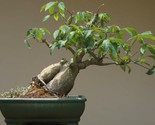Kapok tree, 15 Seeds, CEIBA PENTANDRA, Silk Cotton Tree interesting bonsai tree
Ships from
Thailand

Shipping options
Seller handling time is 2 business days Details
This reflects the seller's handling time and may not include time spent in transit.
If you have questions about shipping, please contact the seller.
£4.45 to United Kingdom
Ships from
Thailand

Return policy
Full refund available within 90 days
Payment options
PayPal accepted
PayPal Credit accepted
Venmo accepted
PayPal, MasterCard, Visa, Discover, and American Express accepted
Maestro accepted
Amazon Pay accepted
Nuvei accepted
Shipping options
Seller handling time is 2 business days Details
This reflects the seller's handling time and may not include time spent in transit.
If you have questions about shipping, please contact the seller.
£4.45 to United Kingdom
Ships from
Thailand

Return policy
Full refund available within 90 days
Payment options
PayPal accepted
PayPal Credit accepted
Venmo accepted
PayPal, MasterCard, Visa, Discover, and American Express accepted
Maestro accepted
Amazon Pay accepted
Nuvei accepted
Item traits
| Category: |
Seeds & Bulbs
|
| Quantity Available: |
40 in stock
|
| Condition: |
Unspecified by seller, may be new.
|
Listing details
|
Seller policies:
|
View seller policies
|
|
Shipping discount:
|
Items after first shipped at flat $0.00
|
|
Posted for sale:
|
More than a week ago
|
|
Item number:
|
708436865
|
Buy 5 or more items and receive a 25% discount
use coupon code: 25PERCENTOFF
Ceiba pentandra. commonly known as the Kapok tree or Silk-cotton tree The Kapok tree is a majestic tree of the tropical rainforests. It can grow to a height of 150 feet or more, towering over other trees in the rainforest. Originally a native to South America it now has spread to the primary rainforests of West Africa, and the Southeast Asian rainforests.
The straight trunks are cylindrical, smooth and gray in color, and can reach a diameter of 9 feet. Large spines protrude from the trunk to discourage damage to the trunk. Thin, plank type buttresses stabilize the giant and can extend to 30 feet. The wood is a pinkish white to ashy brown in color, with a straight grain. The branches grow in horizontal tiers, and spread widely.
Kapoks are drought deciduous. This means they shed most or all of their leaves during the tropical dry season. The dry season occurs during the northern hemisphere winter. The leaves are palmate and compound. The 5-9 leaflets are 7-8 cm long and 1-3.5 cm wide. Flowers usually open before the leaves appear, and are clustered on small, new branches. The 5 petals of a flower are about 2.5 cm long and are a creamy white or pale pink in color. The brown seeds are round like peas and are found in pods. The pods are woody, smooth and pendulous, with a light green color. They will burst open while still on the tree after the leaves have fallen. Inside a whitish cotton like fiber surrounds the brown seeds. These are born away on the wind.
In many places the straight trunks of the kapok tree are used to make dugout canoes. The white, fluffy seed covering is used in pillows and mattresses. Since it is buoyant and water resistant it is often used in flotation devices and padding. The seeds, leaves, bark and resin have been used to treat dysentery, fever, asthma, and kidney disease. In Mayan myths the kapok tree was sacred. They believed that the souls of the dead would climb up into the branches which reached into heaven.
This listing is for 15 fresh seeds
